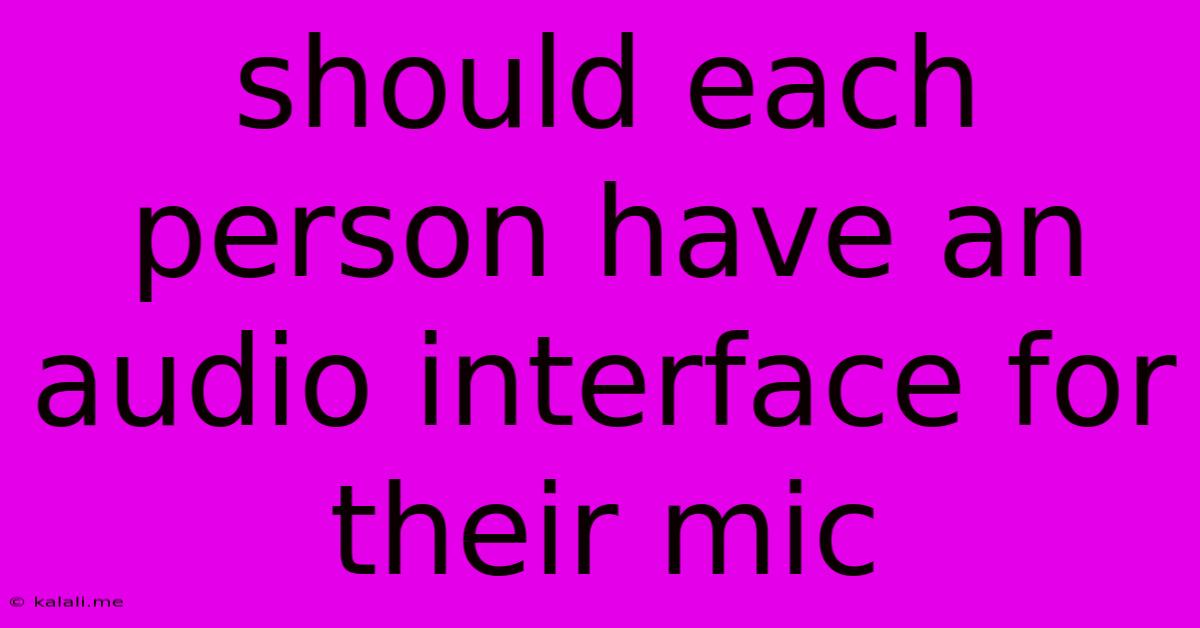Should Each Person Have An Audio Interface For Their Mic
Kalali
Jun 10, 2025 · 3 min read

Table of Contents
Should Everyone Own an Audio Interface for Their Microphone?
Meta Description: Choosing between using your computer's built-in sound card and an audio interface for your microphone can be tricky. This article explores the benefits and drawbacks of each, helping you decide if an audio interface is right for you. We'll cover sound quality, flexibility, and cost to guide your decision.
The question of whether everyone needs an audio interface for their microphone is a common one among aspiring podcasters, musicians, and voice-over artists. The short answer is: it depends. While a dedicated audio interface offers significant advantages, it's not necessarily a requirement for everyone. This article will delve into the pros and cons to help you make an informed decision.
Understanding the Basics: Built-in Sound Cards vs. Audio Interfaces
Your computer's built-in sound card handles audio input and output. It's convenient and requires no extra setup. However, these integrated sound cards often compromise on audio quality, offering limited headroom and potentially introducing noise.
An audio interface, on the other hand, is an external device that improves audio signal processing. It acts as a bridge between your microphone and computer, providing clearer, cleaner audio with less background noise. They offer several benefits, including higher bit depth and sample rates, resulting in superior audio fidelity. Furthermore, many audio interfaces offer phantom power for condenser microphones, something often missing from onboard sound cards.
When an Audio Interface is a Worthwhile Investment
Several scenarios strongly suggest investing in an audio interface:
-
High-quality audio recording is paramount: If you're a musician recording instruments, a podcaster striving for professional sound, or a voice actor needing pristine voiceovers, the enhanced audio quality an interface provides is indispensable. The difference in clarity and detail is substantial.
-
Using a condenser microphone: Condenser mics usually need phantom power (+48V) to operate correctly. While some sound cards provide this, many don't, making an audio interface essential for using these high-quality microphones.
-
Multiple input needs: If you plan on recording multiple sources simultaneously—for instance, a band with multiple instruments—an audio interface with multiple inputs is necessary. Built-in sound cards typically only offer one or two inputs.
-
Low-noise recording environment is crucial: Audio interfaces often boast superior signal-to-noise ratios compared to built-in sound cards, making them ideal for recording in environments where even slight background noise can be problematic. This is especially important for quiet recordings or those needing a high dynamic range.
-
Professional audio software usage: Many professional Digital Audio Workstations (DAWs) benefit from the lower latency and improved audio quality an interface provides. This smoother workflow leads to a more efficient and enjoyable recording process.
When a Built-in Sound Card Might Suffice
For some users, the built-in sound card might be adequate:
-
Casual recording: If you're just occasionally recording simple voice notes or low-quality audio for personal use, the quality difference might not be noticeable.
-
Budget constraints: Audio interfaces can be an added expense, so if you're on a tight budget, prioritizing other equipment might be necessary. However, keep in mind that investing in a good quality microphone may be wasted if your sound card is subpar.
-
Simple setup preference: The simplicity of using a built-in sound card is appealing to beginners who are still familiarizing themselves with the recording process.
Conclusion: Weighing the Pros and Cons
Ultimately, the decision of whether or not to purchase an audio interface hinges on your individual needs and priorities. If you prioritize high-quality audio, flexibility, and professional results, an audio interface is a worthwhile investment. However, if your audio needs are less demanding, a built-in sound card might suffice. Consider your budget, recording style, and future aspirations when making your decision. Remember to prioritize a good quality microphone regardless of your choice of sound card or interface.
Latest Posts
Latest Posts
-
What Is The Difference Between Scarcity And Shortage In Economics
Jun 12, 2025
-
Common Scripts For News Anchor Weather
Jun 12, 2025
-
Is Nopat The Same As Net Income
Jun 12, 2025
-
The Intersection Of A Column And Row Is Called A
Jun 12, 2025
-
Which Of The Following Best Describes Ecommerce
Jun 12, 2025
Related Post
Thank you for visiting our website which covers about Should Each Person Have An Audio Interface For Their Mic . We hope the information provided has been useful to you. Feel free to contact us if you have any questions or need further assistance. See you next time and don't miss to bookmark.